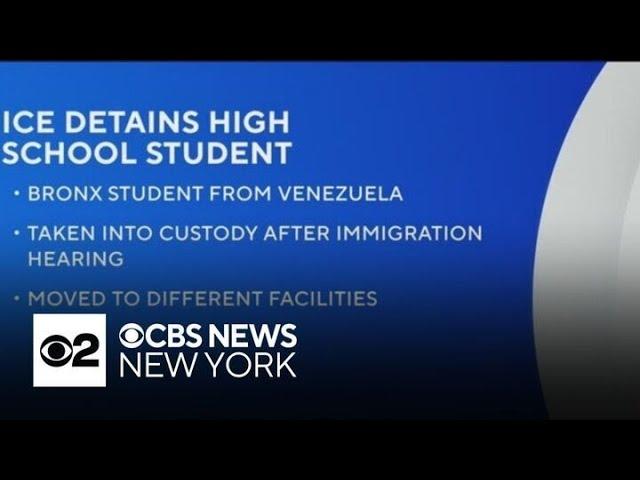Unexpected ICE Detention of Bronx Student Sparks Community Outcry and Calls for Reform
Routine Immigration Hearings Turn into Enforcement Traps in the Bronx
During what was supposed to be a routine immigration court appearance, a high school student from the Bronx was abruptly detained by Immigration and Customs Enforcement (ICE) officers. This incident has ignited alarm within the local community and among immigrant rights advocates, highlighting a disturbing pattern where ICE uses court hearings—traditionally safe spaces for legal proceedings—as opportunities to apprehend individuals. Such tactics not only instill fear but also fracture families and undermine confidence in the justice system’s fairness.
Community organizations have reported a surge in similar detentions at immigration hearings, urging lawmakers to reconsider aggressive enforcement strategies. Key concerns raised include:
- Surprise apprehensions: ICE agents strategically positioned at courtrooms to detain attendees without prior warning.
- Emotional toll: Heightened anxiety discourages immigrants from engaging with the legal process.
- Family upheaval: Sudden separations leave families unprepared and vulnerable.
- Demand for policy change: Calls for protective measures to safeguard immigrant rights during judicial proceedings.
| Category | Recent Data |
|---|---|
| Detentions at Bronx Courts | 40% increase over the past six months |
| Families Affected | More than 100 since the start of the year |
| Court Appearance Rates | 15% decline attributed to fear of ICE presence |
How Sudden ICE Arrests Disrupt Immigrant Students and Their Families
Unexpected detentions at immigration hearings have profound consequences for immigrant youth, many of whom attend court expecting due process but instead face immediate custody. This practice disrupts their education and destabilizes family units, often leaving relatives without prior notice and struggling with emotional and financial hardships. The ripple effects extend beyond individuals, fostering a climate of fear that permeates schools and neighborhoods.
Educators and legal advocates have observed declines in school attendance and participation among immigrant students, who may avoid court or school altogether due to anxiety over potential ICE encounters. The social and psychological impacts include:
- Increased trauma and stress within families fearing sudden separation.
- Interrupted academic progress from missed classes and legal obligations.
- Financial burdens stemming from unexpected legal costs and lost income.
- Social isolation, reducing access to community resources and support.
| Impact Area | Immediate Effect | Long-Term Consequence |
|---|---|---|
| Education | Absenteeism | Lower graduation rates |
| Mental Health | Elevated anxiety | Chronic trauma |
| Family Stability | Sudden separation | Permanent family breakdown |
| Community Trust | Distrust of institutions | Decreased civic participation |
Advocates Push for Legal Safeguards to Protect Immigrant Rights in Court
Legal experts and immigration advocates are calling for urgent reforms to protect the rights of immigrants during court proceedings. The recent case involving the Bronx student detained unexpectedly at a routine hearing has intensified demands for transparency and procedural fairness. Experts stress the necessity of preventing surprise enforcement actions that generate fear and confusion among vulnerable populations.
Proposed reforms focus on:
- Enhanced notification protocols ensuring immigrants receive timely, clear information about court dates and potential consequences.
- Restrictions on ICE presence within courtrooms to preserve the impartiality and safety of judicial processes.
- Guaranteed access to legal counsel for all individuals facing immigration hearings, addressing disparities linked to self-representation.
| Policy Focus | Current Issue | Suggested Improvement |
|---|---|---|
| Notification | Poor communication leads to missed hearings | Mandatory multilingual reminders via multiple channels |
| Enforcement Presence | ICE ambushes at court facilities | Ban on enforcement actions inside courthouses |
| Legal Representation | High rates of unrepresented immigrants | Funding for public defenders specializing in immigration law |
Community Groups Rally to Support Immigrant Youth Facing ICE Threats
In light of escalating ICE enforcement targeting immigrant youth, grassroots organizations in the Bronx have mobilized to offer comprehensive support. Groups such as The Bronx Immigrant Alliance and Youth for Justice have established rapid response teams that provide immediate legal aid, emotional counseling, and rights education. These organizations conduct regular workshops and “know your rights” sessions to empower young immigrants navigating the complex legal landscape.
Beyond legal assistance, these coalitions collaborate with schools, faith-based groups, and mental health professionals to deliver holistic care. Volunteer-led programs create safe environments and after-school activities, helping immigrant youth maintain educational engagement despite the looming threat of detention. Key services currently offered include:
| Service | Description | Availability |
|---|---|---|
| Legal Support | Free consultations and court accompaniment | Monday to Friday, 9 AM – 5 PM |
| Rights Education | Workshops on immigration laws and protections | Weekly on Saturdays |
| Mental Health Services | Trauma-informed counseling and stress management | By appointment |
| Community Outreach | Resource distribution and awareness campaigns | Ongoing |
Conclusion: The Human Cost of Immigration Enforcement in Everyday Life
The detention of a Bronx high school student during a routine immigration hearing exemplifies the increasing intrusion of enforcement actions into the daily lives of immigrant families. This event raises critical concerns about due process, fairness, and the erosion of trust in public institutions. As ICE continues to conduct arrests in settings traditionally reserved for legal proceedings, advocates emphasize the urgent need for reforms that protect vulnerable individuals and uphold the integrity of the immigration system. Ultimately, this case serves as a poignant reminder of the profound human impact behind immigration policies and the ongoing debate over enforcement practices in schools and courts nationwide.













